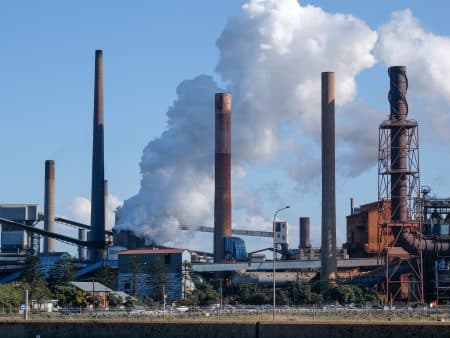Industrial cyclone separators might not grab headlines, but they quietly play a critical role in modern industries. These efficient and versatile devices remove unwanted particles from air streams, ensuring cleaner workplaces, smoother processes, and environmental compliance.
However, navigating the world of industrial cyclone separators can be confusing. This article serves as your practical guide, explaining how these “whirling wonders” work and highlighting their diverse applications across various industries.
What is an Industrial Cyclone Separator?
At the heart of the cyclone separator lies a simple yet effective process. As gas or air containing dust or unwanted particles enters tangentially, it’s forced into a high-velocity spiral within the cylindrical chamber. This swirling motion generates powerful centrifugal forces, which force heavier particles outward toward the conical walls. These particles then spiral down the conical surface and collect in a dedicated hopper at the bottom. Meanwhile, the lighter, cleansed gas ascends and exits through the top, leaving you with purified air and separated material for potential recovery or disposal.
Why Use an Industrial Cyclone Separator?
The benefits of implementing industrial cyclone separators are many:
- Cleaner Air: They effectively remove dust, sawdust, metal shavings, and other airborne contaminants, ensuring a healthier and safer work environment for your employees.
- Enhanced Efficiency: By removing abrasive particles, cyclone separators protect your machinery from wear and tear, minimizing downtime and maintenance costs.
- Environmental Protection: Reduced emissions benefit not only your workforce but also the surrounding community, minimizing your environmental footprint.
- Material Recovery: The separated material often has economic value, whether it’s recycled back into your processes or sold as byproduct.
How Do Industries Use Industrial Cyclone Separators?
The beauty of industrial cyclone separators lies in their versatility, allowing them to find application across a wide spectrum of industries, each of which benefits from their ability to tame dust and keep processes running smoothly. Let’s delve into some key sectors where cyclone separators play starring roles:
- Woodworking and Construction: Sawdust, wood chips, and shavings pose a major risk in these industries. Standard cyclones effectively capture these larger particles, ensuring worker safety and preventing equipment damage.
- Metalworking and Fabrication: Grinding and cutting processes generate metal dust, a hazardous and abrasive nuisance. High-efficiency cyclones step up here, capturing even fine metal particles for a cleaner and safer work environment.
- Food and Beverage Processing: From flour dust in bakeries to grain dust in silos, ensuring a clean and contaminant-free production line is crucial. Multi-cyclone units handle the high airflows and dust loads characteristic of these industries, safeguarding product quality and hygiene.
- Chemical and Pharmaceutical Production: Handling fine and potentially hazardous powders demands a high level of precision. High-efficiency cyclones, meticulously designed for specific particle sizes, ensure containment and prevent cross-contamination in these sensitive environments.
- Power Generation and Cement Manufacturing: Coal dust and mineral particles pose significant challenges in these industries. Powerful multi-cyclone systems tackle these heavy dust loads, protecting both equipment and the environment from harmful emissions.
Beyond these examples, the applications extend far and wide:
- Textile mills: Capturing lint and fiber dust for a cleaner production environment.
- Agriculture and mining: Separating dust from grain or ore processing for improved product quality and dust control.
- Electronics and plastics manufacturing: Protecting sensitive equipment from fine dust particles with high-efficiency cyclones.
As you can see, the ability of cyclone separators to tackle diverse dust challenges across industries is truly remarkable. From basic wood shavings to fine chemical powders, these versatile devices prove their worth in every corner of the industrial landscape.
Industrial Cyclone Separator Variations: Finding the Right Fit
Beyond the basic concept, industrial cyclone separators come in three key variations, each tailored to specific needs:
Standard Cyclone
- The Workhorse: The most common and versatile type, ideal for general dust collection in typical industrial settings.
- Large Particle Focus: Effectively captures larger particles like sawdust, wood chips, and metal shavings.
- Simple Design: Easy to install, maintain, and operate, making them cost-effective for basic dust control.
- Limitations: Not as efficient for capturing finer particles (below 10 microns) compared to other types.
High-Efficiency Cyclone
- Finesse Over Brute Force: Engineered for superior capture of finer particles in the 5-10 micron range.
- Advanced Design: Utilizes sophisticated internal geometries and airflow patterns to maximize separation efficiency.
- Ideal Applications: Pharmaceutical, chemical, and electronics industries where fine dust control is crucial.
- Trade-Offs: Higher initial cost and potentially more complex maintenance compared to standard cyclones.
- Capacity Champions: Designed to handle high-volume airflows and large dust loads.
- Multiple Mini-Cyclones: Combines several smaller cyclones within a single unit for increased dust collection capacity.
- Applications: Foundries, grain processing, and power plants where massive dust generation occurs.
- Considerations: Larger footprint and higher cost compared to single cyclones.
Choosing the Right Cyclone Separator
With a plethora of options available, selecting the right cyclone separator requires careful consideration. Factors like particle size, gas flow rate, desired efficiency, and budget all play a role. Consult with one of our experts to ensure you invest in the perfect cyclone for your unique needs.



